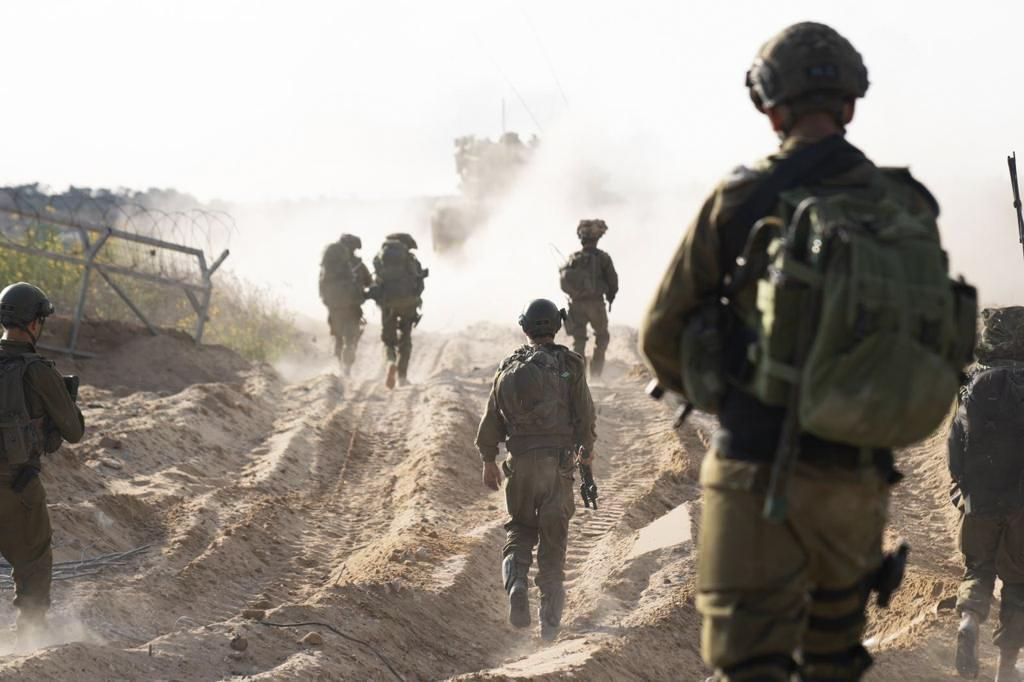
The Israeli army will be entering a new phase in the Jewish state’s longest war in the coming weeks and months — a task that could further burden its already overstretched army.
Prime Minister Benjamin Netanyahu said Israeli forces will move into the Gaza Strip to assume military control there before handing the Palestinian enclave over to unidentified Arab forces.
Israeli troops will move into Gaza to ensure the country’s security, retrieve the remaining hostages, and remove Hamas as the governing authority there, Mr. Netanyahu told Fox News on Thursday.
“We don’t want to keep it. We want to have a security perimeter,” Mr. Netanyahu said. “We don’t want to be there as a governing body.”
Governing or not, the Israeli Defense Forces have already fought Israel’s longest war since its 1948 independence and some cracks are starting to show.
Rising fatigue in the Israel Defense Forces ranks caused Lt. Gen. Eyal Zamir, the IDF Chief of Staff, to reportedly order a 30% reduction in the number of Army reservists deployed to active combat zones in the West Bank.
About half of Israel’s armed forces are reservists, who often move over to the part-time ranks following their active service in the Army.
“The purpose of the move is to ease the burden on the reserve army as much as possible,” he said, according to Israel’s state-owned Army Radio news channel. “Attrition is steadily increasing, and the burden has already been heavy in the past six months.”
Dr. Eyal Fruchter, a former chief psychiatrist for the Israel Defense Forces, said the IDF is built on reserve forces.
“They have families and they have workplaces. They need to be at home with the kids and with the spouse,” Dr. Fruchter told The Washington Times. “If they go home for a month, that’s usually okay because everyone in Israel knows it’s mandatory.”
Israel’s dilemma is that after a few months at home, reconnecting with family members and going back to their civilian jobs, the reservists are often called back up for another hitch in the ranks.
“When they come back, they often don’t have the time to reintegrate into the rhythm of civilian life and lower their tension level,” Dr. Fruchter said. “It broke people. They can’t relax because they can’t lower the tension.”
Israel has traditionally been able to make quick work of any adversaries it faced on the battlefield, smashing a coalition of Arab armies during the Six-Day War in June 1967, for example.
Battling Hamas has been a challenge to the IDF because of the terror group’s vast network of tunnels running beneath Gaza, and the requirement to launch missions into a heavily built-up urban area where it’s nearly impossible to tell a combatant from a civilian.
“All that together has made the war in Gaza much more complicated and longer than we anticipated,” said retired Israeli Army Maj. Gen. Yaakov Amidror, a former national security advisor to Mr. Netanyahu.
Extended periods of service for Israeli army reservists can take a serious toll on a returning soldier’s civilian employment, said Gen. Amidror, who is also a fellow with the Jewish Institute for National Security of America.
“If somebody is a student in a university and serves 200 days during the year, he loses the [academic] year. If he has a shop in Tel Aviv, he’s losing his customers,” he said.
A recent study by Tel Aviv University found that 12% of IDF reservists reported symptoms of post-traumatic stress following combat operations.
“If there are approximately 15,000 combat soldiers in one recruitment cycle, and there are three cycles per year, we’re talking about roughly 2,500 new soldiers annually who struggle with PTSD symptoms. This is just from routine combat service, not including wars or unusual events,” said Yair Bar-Haim, head of the National Center for Trauma and Resilience at Tel Aviv University and the study’s lead researcher.
About 85% of the study participants were called up for reserve duty following the outbreak of “Operation Iron Swords,” Israel’s military response to the Hamas attack.
“This war has brought us to a point where 12% experience PTSD symptoms,” said Mr. Bar-Haim. “This is a high number, but not unusual when compared to similar wars in the past, both in Israel and the United States: Vietnam, the Yom Kippur War, the First Lebanon War, Afghanistan, and Iraq. The professional literature fully supports this figure.”
Turnout for returning Army reservists was high in the early days of the war, immediately after Hamas launched its raid into southern Israel that killed some 1,200 people, including about 50 Americans.
Some units had more volunteers than they needed.
“They were having 120% returning,” Gen. Amidror said. “People who were supposed to be out of the units because they were too old said, ‘Hey, we want to fight.’”
Today, that number is around 80%. It’s a sign of the problematic economic situation with IDF reservists.
In most cases, the soldiers ended up being released by their commanders so they could remain at their civilian jobs, Gen. Amirdror said.
“They know each other and they know the problems of every member of their unit,” he said. “The Israeli army is very flexible.”





![Gavin Newsom Threatens to 'Punch These Sons of B*thces in the Mouth' [WATCH]](https://www.right2024.com/wp-content/uploads/2025/08/Gavin-Newsom-Threatens-to-Punch-These-Sons-of-Bthces-in-350x250.jpg)
![ICE Arrests Illegal Alien Influencer During Her Livestream in Los Angeles: ‘You Bet We Did’ [WATCH]](https://www.right2024.com/wp-content/uploads/2025/08/ICE-Arrests-Illegal-Alien-Influencer-During-Her-Livestream-in-Los-350x250.jpg)







